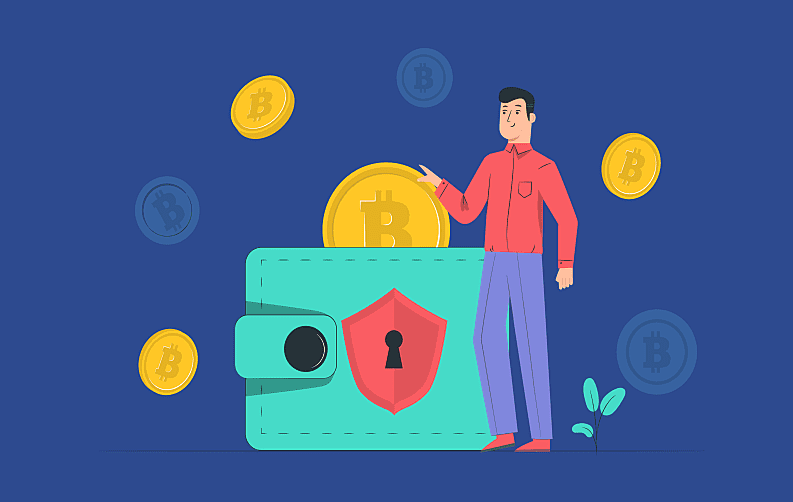
-
10 Ways To Keep Bitcoin Wallet Safe
- Pick hardware wallets
- Empower Two-Factor Authentication (2FA)
- Encrypt your Bitcoin wallet
- Keeping the private key offline
- Never use a pre-generated Key/Seed- It’s a SCAM!
- Do multi-signature
- Use different passwords for different accounts
- Use good antivirus software
- Backup of digital wallet
- Create a separate wallet for day-to-day transactions

With over 4,000 cryptocurrencies being traded as of January 2021, still, even today, Bitcoin is considered one of the most thriving cryptocurrencies.
Bitcoin (BTC) is the world's oldest and the second-largest cryptocurrency at USD 70.45 billion in the world, created in 2009 by an unknown person using the alias Satoshi Nakamoto.
Besides data transparency and user privacy, the biggest factor behind the success of Bitcoin is online exchange flexibility. With 40M+ users worldwide, Bitcoin is accepted on a majority of trading sites as compared to other cryptocurrencies. Consequently, it invites hackers to steal the funds of Bitcoin beginners who don't really pay attention to the security and become part of Bitcoin scams.
Bitcoin trading is supported by hundreds of Bitcoin wallets globally. Wondering, what is a Bitcoin wallet? To transact in Bitcoin, you need a safe and secure cryptocurrency wallet to send, receive, or simply store Bitcoin. As Bitcoin is decentralized, and due to the lack of centralized authority overseeing the asset, it is vulnerable to cyberattacks.
If you are a new Bitcoin user looking for how to safely store Bitcoin, here are the 10 safest ways to store Bitcoin from the eyes of cybercriminals.
10 Ways To Keep Bitcoin Wallet Safe
Here are the 10 ways on how to secure your Bitcoin Wallet and protect your cryptos from getting hacked.
1. Pick hardware wallets
Where do I keep my Bitcoins? In order to trade Bitcoins, there are so many different Bitcoin Wallet options available. But, why should one always prefer hardware wallets over all other options? Hardware Wallets (often called Cold Wallets) provide the safest way to store Bitcoin with an offline layer of security.
If we talk about hot wallets, they are constantly connected to the internet and become more vulnerable to malicious intrusions. Whereas, Hardware wallets are immune to virus attacks as they are physical devices plugged into computer systems through USB ports, which adds an extra layer of security from external threats. Some of the popular Bitcoin wallet apps are Trezor Model T, Ledger Nano S, Coinkite ColdCard, etc.
2. Empower Two-Factor Authentication (2FA)
Two-factor authentication (also known as 2FA, or two-step verification) is an extra important layer of security you can set up to keep your Bitcoin wallet safe. When you create a Bitcoin Wallet, you are asked to set your own password and receive your identifier. By default, these are the only two pieces of information required to access your wallet.
On setting up 2FA in your Bitcoin wallet security section, it will add an extra third credential required to log in to your wallet successfully. A unique one-time passcode will be generated for each login attempt.
3. Encrypt your Bitcoin wallet
This is another way of securing your cryptocurrency wallet. In encrypted mode, you set a unique password to lock your Bitcoins when hackers attempt to reach your Bitcoin Wallet account.
4. Keeping the private key offline
You can protect your wallet by taking your private key disconnected from the online world. You can save that key by noting it down on paper and keeping it in a safer place, rather than storing it in any of your digital gadgets. Your private keys are extremely important to you. Make sure they are as confidential as your bank account PIN.
5. Never use a pre-generated Key/Seed- It’s a SCAM!
Are you willing to risk your wallet? It is seen that blockchain bandits easily guess the private keys and steal the money. It is mind-game scammers use to play to sell pre-made or hacked paper wallets on a variety of eCommerce platforms like eBay or Amazon. These pre-made wallets are created by hackers who store a copy of the recovery seed (24 words long usually) and wait for you to deposit funds.
6. Do multi-signature
If you are dealing with Bitcoins for quite a long time, and you’re trading with large funds, it is advisable to enable a multi-signature or multi-sig feature. Multisignature (multi-sig) is useful when there are multiple signers linked to your account. It refers to asking for two or more private keys to sign and authorize a Bitcoin transaction. Multisig makes Bitcoin wallets more secure, especially for corporate use cases.
7. Use different passwords for different accounts
Another key aspect of Bitcoin Wallet security lies in password strength. When you don’t use the common password for your social media accounts, how can you use it for your Bitcoin Wallet? It is always better to create strong and distinct password combinations for every account you use.
The Bitcoin Wallet password should be an alphanumeric combination of mixed characters, with uppercase and lowercase, special characters, and numbers. The password you use should be kept confidential and must not be shared with anyone, at any cost.
8. Use good antivirus software
The antivirus software works best when it comes to protecting Bitcoin Wallets against crypto-related threats. For this reason, it is recommended to use genuine antivirus software that keeps your wallet protected from malicious cyber-attacks and unwanted intrusions. So, if you’re doing Bitcoin trading, it is important to do a proper device scan before installing your wallet.
9. Backup of digital wallet
Data backup allows you to access the data when you’ll have no data left in the system (i.e. at the time of malware attack or system failure). Some digital wallet apps have a built-in data backup feature.
You can find “Bitcoin wallet” or “Export private keys’’ options in your Bitcoin wallet menu based on the storage location of your Bitcoins. If you have made a digital backup file (preferably encrypted), you will need to store this exported backup to a flash drive or copy it to a piece of paper and store it in a safe location.
10. Create a separate wallet for day-to-day transactions
Today, mobile payments are on the rise. If you make transactions daily, you can create a separate wallet for small transactions you are doing during the day. Moreover, you can create many wallets and add multiple addresses.
Let’s do it now!
“Don’t get mad, get even”
~ John F. Kennedy
Remembering the famous quote, which says when suffering a loss at the hands of another, don't waste your energy on anger but work towards it. That’s also applicable to Bitcoin. Don’t give any chance to hackers or scammers, rather secure cryptocurrency wallets with advanced Bitcoin hacks.
So, if you still have confusion regarding whether Bitcoin Wallet is safe or not, or don’t know where to keep your Bitcoins, then keep the above points in your head when trading in Bitcoin.
If you have a sparkling idea, it is the right time to implement blockchain for a business. Here’re the top Blockchain companies in the world, you can check. Or if you are an aspiring business, in search of an audience to showcase your developed iOS, Android, Amazon, and Windows Games, and Apps, just submit to MobileAppDaily, get your app reviewed, and get leveraged by our expanding user base.









